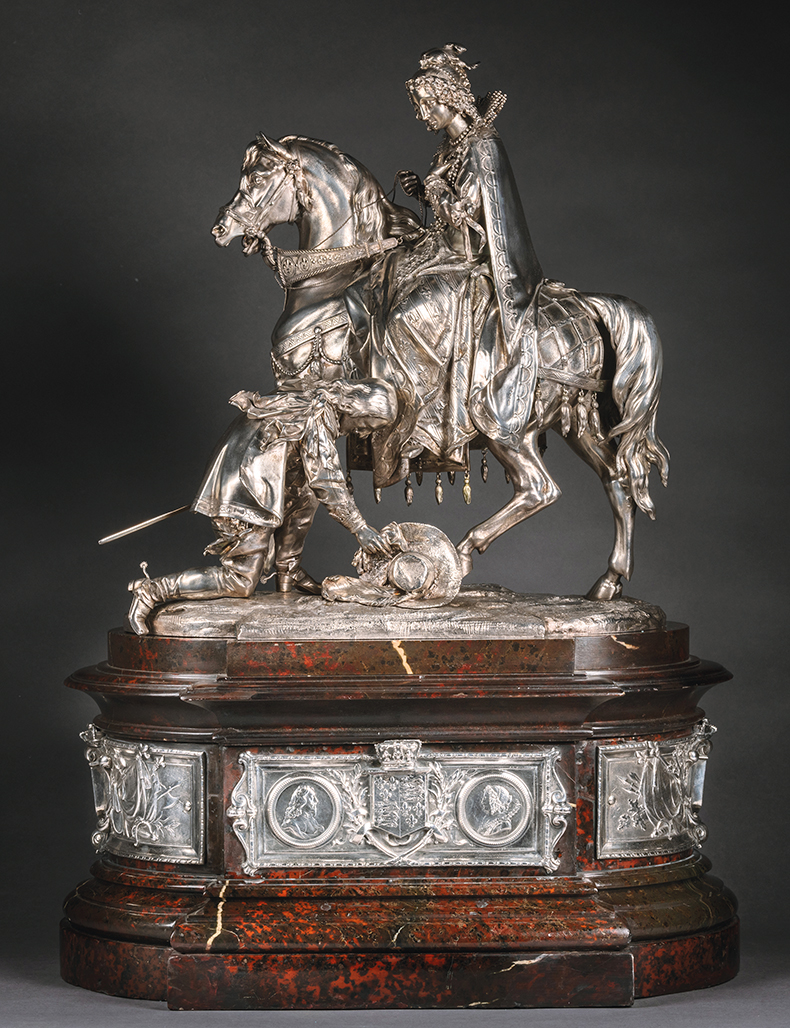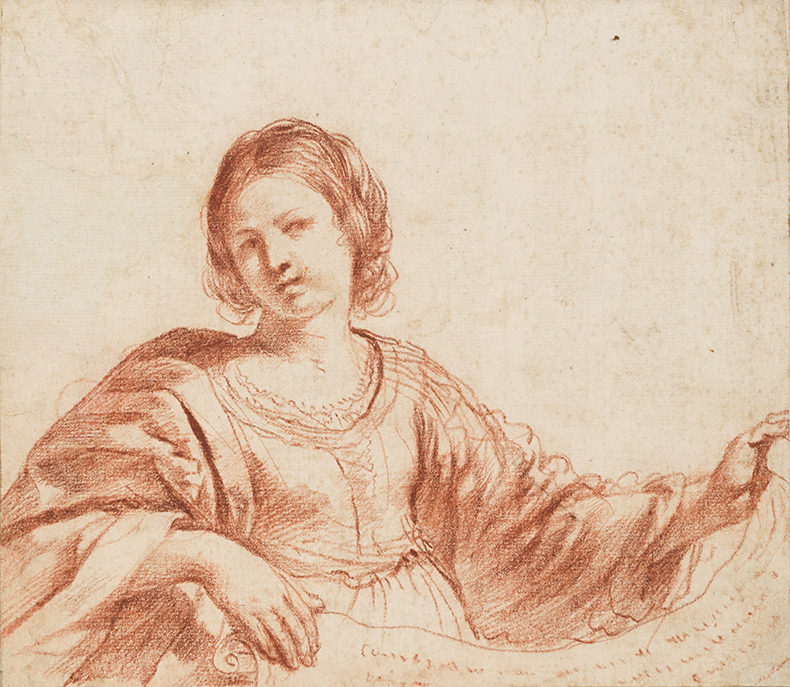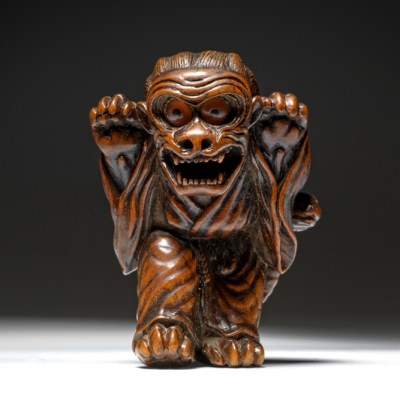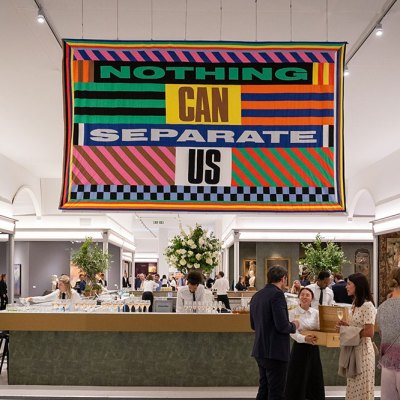From the June 2024 issue of Apollo. Preview and subscribe here.
Treasure House Fair
When Masterpiece, the mainstay of London’s summer fair season, was cancelled last year with little notice after 13 years of operation, co-founders Thomas Woodham-Smith and Harry Van der Hoorn were quick to enter the breach. The Treasure House Fair was organised in just four months by the pair – a remarkable feat by any standard.
‘We did everything in a tearing hurry, and it’s fair to say there were one or two oversights,’ Woodham-Smith says, presumably referring to the maintenance issues that dogged the tent at the Royal Hospital Chelsea. ‘But it’s very different having a year to do something versus having four months. We won’t get it all perfect, but we won’t make the same mistakes as in 2023.’
Ambitions for the second edition are high: the fair has expanded by 30 per cent, up to a total of 70 exhibitors. The organisers pride themselves on quality control, with every exhibitor carefully vetted by an advisory board. ‘That means that the process of expanding is very slow,’ says Woodham-Smith, ‘but at the same time it’s very controlled.’ They are careful to stipulate that what they describe as the ‘perhaps rather bling approach’ of Masterpiece has been replaced with something more rigorous.
The Warwick Cup (c. 1852–53), Pierre-Emile Jeannest. Adrian Alan Ltd, London.

That’s not to say that ‘bling’ is off the table entirely. This year’s special exhibition comprises gemstones all weighing 100 or more carats, co-curated by the jeweller Robert Procop (previously head of Asprey in London), and first displayed as ‘100 Carats: Icons of the Gem World’ in the vault of the Natural History Museum of Los Angeles County. ‘All these really unfeasibly sized rocks are going to turn up – obviously we’ll have to have fantastic security. We hope it’ll be both entertaining and enlightening.’
Joining the 2023 cohort are galleries including jewellery specialists S.J. Shrubsole and À La Vieille Russie, both from New York; antiquities dealer Galerie Cahn from Basel; and Maison d’Art from Monaco. It’s an international lineup of which the pair are clearly proud. ‘Even though there’s Brexit or other turmoil around the world, both Europe and America like to do business in London,’ Woodham-Smith says.
What are the founders most looking forward to at the fair? For Van der Hoorn, it’s seeing the pregnant ichthyosaur promised by fossil specialist Stone Gallery and a panel holding 1,000 fossilised flowers. For Woodham-Smith, it’s a rather more ‘sybaritic’ pleasure, as he puts it: oysters. ‘To me, eating an oyster at Treasure House is like having a Proustian madeleine-type experience.’ The pair are keen to emphasise the importance of enjoyment at such events – the fact that, though the curatorial approach may be serious, the overall experience should be fun, even frivolous.
When I ask what might come next for the fledgling fair, Van der Hoorn is emphatic: ‘You have Ascot, you have Wimbledon and you have Treasure House. I hope in the future you will have Treasure House, Wimbledon and then Ascot.’ Whatever happens next, it is sure be an interesting ride.
The Treasure House Fair is at the Royal Hospital Chelsea, London, from 27 June–2 July. For more details, go to www.treasurehousefair.com.
London Art Week
‘Each year we try to do something new,’ says the director of London Art Week (LAW), Luce Garrigues. ‘This adds to the structure we have each year of exhibitions happening in galleries across London.’ Special subjects in recent years have included music and books. For this edition, it’s drawing.
To that end, LAW is collaborating with Trois Crayons, an organisation founded in 2023 to promote ‘awareness, accessibility and visibility of drawings in all their forms’. It is named for the drawing technique pioneered by Rubens in which three colours of chalk are used: red, black and white. As such, it’s unsurprising that the organisation is largely focused on Old Master drawings.
Trois Crayons will have a ‘communal hub’ at Frieze’s Mayfair gallery, No. 9 Cork Street, which will host a dozen or so dealers from overseas. ‘After Brexit we haven’t had so many European dealers coming to exhibit at London Art Week, so it’s just great,’ Garrigues says. The cancellation of this year’s edition of an annual specialist sale was one impetus behind the choice of special subject, with LAW’s organisers keen to cater to disappointed collectors, curators and dealers of works on paper. (Appropriately, a beautifully drawn map by the artist Adam Dant illustrates this year’s trail.)
Another reason for this year’s focus is that drawings can be, comparatively speaking, affordable. ‘It’s an entry point for both collectors and dealers – when they start out, they like selling drawings because they can find really good-quality work for a good price.’ She points to Elliott Fine Art and Nonesuch Gallery as examples of young dealerships making their names with works on paper. This year, Elliott is showing portraits by or of women artists from the long 19th century, while Nonesuch – whose founder, Tom Mendel, is just 29 – will be exhibiting depictions of Italy from the 16th to 19th centuries.
The Hellespontine Sibyl (n.d), Giovanni Francesco Barbieri, called Guercino. Stephen Ongpin Fine Art, London

At the other end of the spectrum is gallerist and LAW chairman Stephen Ongpin, who has worked in the Old Masters field for more than 30 years. This year, his Mayfair gallery will mount a show focused on drawings by Guercino. ‘I think it took about 10 years to put all these drawings together,’ Garrigues says. ‘It’s quite rare to see so many drawings by Guercino in private hands – and for sale.’
Other highlights include ‘The Great War: Britain’s Efforts and Ideals’ at Abbott and Holder in Bloomsbury: an exhibition of prints by 18 artists commissioned by the British Government in 1917. These are being sold on behalf of the Imperial War Museum and the proceeds will help fund new acquisitions there.
It’s not just about works on paper this year. As always, LAW has a selection spanning a range of mediums, topics and time periods. Garrigues is particularly enthusiastic about the portrait miniatures from 1600–1800 that will be exhibited by The Limner Company in its debut outing at the event, hosted by Guy Peppiatt Fine Art in Mason’s Yard.
Of course, the appeal of such an affair is seldom just about the art. ‘It’s summer, it’s usually nice outside, and in a couple of hours you can see sculpture in St James’s Square, visit a few fantastic exhibitions, and then go to Christie’s – and the whole thing is just a stroll.’
London Art Week takes place in various venues from 28 June–5 July. For more details, go to www.londonartweek.co.uk.
Gallery highlights
Bomberg – Auerbach
Daniel Katz Gallery, London
20 June–19 July
In 1948, a young Frank Auerbach enrolled to study at Borough Polytechnic in London under the painter David Bomberg: an experience that would prove formative. This exhibition of some 20 paintings and drawings features works by both artists – and for good measure throws in Summer Afternoon (c. 1909) by Walter Sickert, an artist whom Auerbach has often cited as another important influence.
Easy Valley, Cuenca (1934), David Bromberg. Daniel Katz Gallery, London

Boscoe Holder | Geoffrey Holder
Victoria Miro, London
1 June–27 July
The Trinidad and Tobago-born siblings Boscoe and Geoffrey Holder made their mark across art, theatre, dance and film in the UK and United States, respectively, yet somehow their paintings have not – until now – been exhibited together. Highlights of this exhibition include sensual male nudes that remained largely unseen during Boscoe’s lifetime and scenes of domestic life painted by Geoffrey between the 1970s and 2000s.
Vilhelm Hammershøi. Silence
Hauser & Wirth Basel
1 June–13 July
The first exhibition in Hauser & Wirth’s new Basel outpost is focused on that most introverted of artists, Vilhelm Hammershøi. ‘Silence’ aims to cut through the surrounding noise – taking place as it does during Art Basel – with 18 paintings dated between 1883 and 1914, drawn from private collections and curated by the art historian Felix Krämer. It is the first in a series of exhibitions of historic work at the gallery.
Charles Hascoët: Kobayashi Maru
Perrotin, New York
1 June–26 July
Like many millennials, Charles Hascoët – who was born in 1985 – is prone to a certain nostalgia for the ’90s, before smartphones and social media transformed our lives. For his first solo at Perrotin New York, Hascoët is showing still life paintings depicting, among other things, bottles of CK One (the unisex perfume beloved of his generation) and bottles of Listerine mouthwash, reminiscent of illicit smokes and teenage kisses.
Fair in focus
Printemps Asiatique
Various locations, Paris
6–13 June
Printemps Asiatique, the Parisian fair for Asian art and antiques, sees galleries, dealers, auction houses and museums come together in the model of Asia Week New York and Asian Art in London, with the aim of cementing France as the leading market for Asian art in the United States and Europe.
Bodhisattva Maitreya (15th century), Studio of Sonam Gyaltsen, Tibet. Marcel Nies Oriental Art, Antwerp.

For its seventh edition, the fair promises a record number of participants. These include international dealers such as Marcel Nies Oriental Art from Antwerp, Carlton Rochell Asian Art from New York and Tenzing Asian Art from San Francisco and Hong Kong. To accommodate the higher numbers, organisers are adding to its venues the top floors of the Pagoda, the theatrical, red-painted building opened in 1928 by Chinese dealer and collector Ching Tsai Loo in the otherwise Haussmannian neighbourhood of Plaine-Monceau.
Highlights include ‘Au coeur de la couleur’ at the Musée Guimet (12 June–16 September), comprising porcelain from the collection of Richard Kan, and the sale of dealer Jules Speelman’s renowned collection at Bonhams-Cornette de Saint Cyr (11 June).
From the June 2024 issue of Apollo. Preview and subscribe here.



